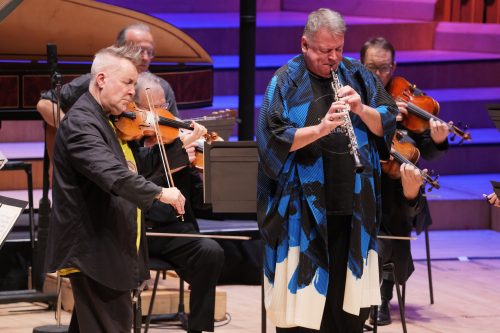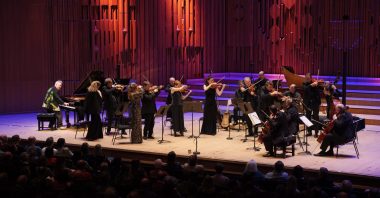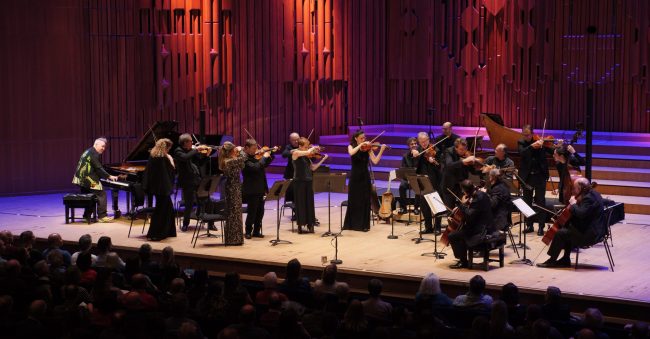 United Kingdom Bach, Kennedy, Sakamoto – Nigel Kennedy: Bach Now!: Nigel Kennedy (violin, piano, conductor), Nicholas Daniel (oboe), Anna-Liisa Bezrodny (violin), Oxford Philharmonic Orchestra. Barbican Hall, London, 14.11.2023. (AK)
United Kingdom Bach, Kennedy, Sakamoto – Nigel Kennedy: Bach Now!: Nigel Kennedy (violin, piano, conductor), Nicholas Daniel (oboe), Anna-Liisa Bezrodny (violin), Oxford Philharmonic Orchestra. Barbican Hall, London, 14.11.2023. (AK)

Bach – Violin Concerto No.1 in A Minor BWV 1041; Concerto in C Minor for Violin and Oboe BWV 1060R; Concerto for Violin No.2 in E Major BWV 1042; Concerto for Two Violins in D Minor BWV 1043
Nigel Kennedy – Melody in the Wind
Sakatomo – A Flower Is Not a Flower
You may call it a circus or populism – as some establishment musicians refer to Nigel Kennedy’s concerts – but Kennedy knows his music and takes it more seriously than many highly respected regular concert artists do. And he plays his violin with mind-blowing energy and virtuosity (plus he plays the piano, too, with ease and competence). There is also Kennedy’s phenomenal musical memory as was evident on this concert. Not only did he play without music throughout, but it was clear from his directing the orchestra that he knew all orchestra parts – and not only the obvious main parts which many conductors are so found of marking with colour in their scores – inside out.
Titled as Nigel Kennedy: Bach Now! the concert included all of Bach’s violin concertos including the Concerto for Violin and Oboe in C minor which is more familiar in its form as concerto for two harpsichords. The programme notes titled this concerto as in D minor; this could have been a typo (or perhaps the presentation was a whole tone lower than usual?).
The programme notes were written by Nigel Kennedy, showing his thorough knowledge as well as his desire to communicate with his audience(s) all-round at all levels. In the event, one of the two pieces planned alongside the Bach marathon, Kennedy’s Fallen Forest was replaced by a piece by Sakamoto, with long but respectful improvisation added by Kennedy. This was included as a tribute to the composer who died earlier this year.
In fact, Kennedy partially contradicted his own programme notes by including two compositions which were not by Bach, and then several encores of which only one was by Bach. In his introduction to his programme notes Kennedy writes: ‘Although it’s not so commonplace, I have found it really works to present all four Bach concertos involving violin as one self-sufficient evening.’ But later in his programme notes Kennedy suggests that putting some of his own compositions between the Bach pieces may offer a fresh perspective into Bach. I am not sure about a fresh perspective, but I did enjoy – and would be happy to hear again – Kennedy’s Melody in the Wind. Well, it sounded like a melody in the wind!

At this Barbican concert the order of the pieces was not exactly as shown in the programme notes but Kennedy and his troupe just finished a week-long tour where the order might have followed the print. Admittedly, Kennedy talked a great deal between pieces making it sure that the audience knew what they were hearing and what Kennedy thought about a variety of matters. Kennedy presented Sakatomo’s A Flower Is Not a Flower by leading the orchestra from the piano, with long – possibly improvised – piano solos.
Throughout the evening, Kennedy paid tribute to his mentors Yehudi Menuhin and Stéphane Grappelli several times. His playing reflected his respect for his mentors, most probably both would have been happy with the performances … even if slightly amused by Kennedy’s attire as well as liberal chatting to audience and orchestra members between pieces.
The performances of the Bach concertos showed Kennedy’s knowledge of baroque performance practice, even if he poked fun of ‘self-appointed experts’ of the academia in his programme notes. His vibrato and bow speeds showed respect for the baroque period and his frequent stamping for driving the music forward was in the spirit of the compositions.
Kennedy’s dynamic scale includes magic pianissimos on his violin and from his band. He was beautifully partnered in the concerto for violin and oboe by oboist Nicholas Daniel whose dynamic scale is also a wonder to behold. The two of them, both playing from memory – Kennedy in his T-shirt and a colourfully costumed Daniel – presented magical lyrical dialogues on their instruments as well as mind-blowing virtuosity in the service of profound music making.
The concerto for two violins did not have the same unity between soloists but probably because Kennedy played from memory while Anna-Liisa Bezrodny played from digital music operated by her foot. She was also somewhat hindered by a mishap: early in the piece the peg of her D string got loose and she needed to retune. ‘Let’s play faster to make up for the time’ quipped Kennedy and for sure they proceeded to play very fast.
Kennedy’s numerous encores included some jazz improvisation with guitar player Rolf Bussalb, some Grappelli piece as well as a phenomenal performance of the first movement of Bach’s Partita No.3 for Solo Violin in E major. This piece would have been a worthy conclusion to Nigel Kennedy: Bach Now! but Kennedy cannot stop; he seems to live for performing on stage and, evidently, he prolongs the opportunities. I was on my way out when I heard some orchestral arrangement on Silent Night, probably the last encore concluding apparently at the rather late time of 10.15pm.
The small twenty-piece band representing the Oxford Philharmonic Orchestra were superb. They allowed Kennedy to tease them on stage – a bit of a waste as only the front rows could hear it – and they gave outstanding musical support throughout. And they seemed to be tolerant even with the never-ending long encores which were wonderful in themselves but people needed to catch their trains home.
The concert left me in awe of Nigel Kennedy’s musicality, knowledge, and skills but also with a warning not to expect a Kennedy concert to last a regular concert length.
Agnes Kory
